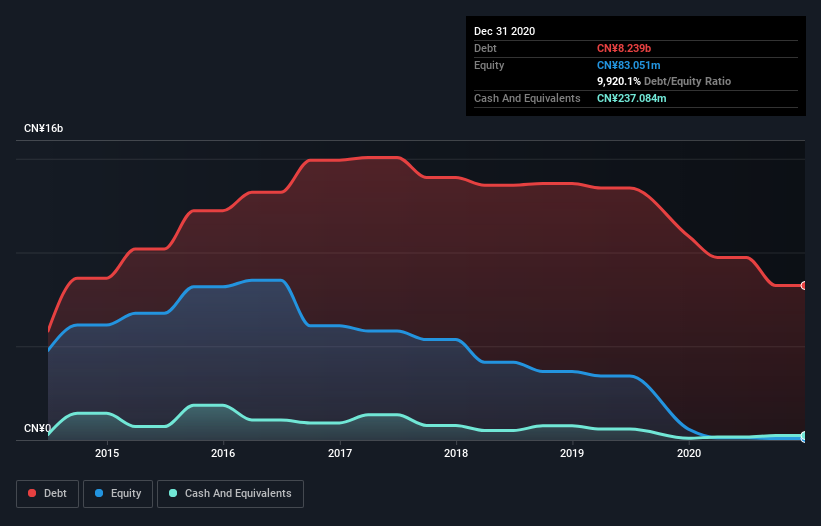- Hong Kong
- /
- Renewable Energy
- /
- SEHK:1165
Shunfeng International Clean Energy (HKG:1165) Takes On Some Risk With Its Use Of Debt

Legendary fund manager Li Lu (who Charlie Munger backed) once said, 'The biggest investment risk is not the volatility of prices, but whether you will suffer a permanent loss of capital.' When we think about how risky a company is, we always like to look at its use of debt, since debt overload can lead to ruin. Importantly, Shunfeng International Clean Energy Limited (HKG:1165) does carry debt. But should shareholders be worried about its use of debt?
Why Does Debt Bring Risk?
Debt is a tool to help businesses grow, but if a business is incapable of paying off its lenders, then it exists at their mercy. If things get really bad, the lenders can take control of the business. However, a more frequent (but still costly) occurrence is where a company must issue shares at bargain-basement prices, permanently diluting shareholders, just to shore up its balance sheet. Of course, debt can be an important tool in businesses, particularly capital heavy businesses. The first thing to do when considering how much debt a business uses is to look at its cash and debt together.
Check out our latest analysis for Shunfeng International Clean Energy
How Much Debt Does Shunfeng International Clean Energy Carry?
The image below, which you can click on for greater detail, shows that Shunfeng International Clean Energy had debt of CN¥8.24b at the end of December 2020, a reduction from CN¥10.9b over a year. However, because it has a cash reserve of CN¥237.1m, its net debt is less, at about CN¥8.00b.

How Strong Is Shunfeng International Clean Energy's Balance Sheet?
Zooming in on the latest balance sheet data, we can see that Shunfeng International Clean Energy had liabilities of CN¥6.89b due within 12 months and liabilities of CN¥2.73b due beyond that. On the other hand, it had cash of CN¥237.1m and CN¥3.36b worth of receivables due within a year. So it has liabilities totalling CN¥6.03b more than its cash and near-term receivables, combined.
The deficiency here weighs heavily on the CN¥677.8m company itself, as if a child were struggling under the weight of an enormous back-pack full of books, his sports gear, and a trumpet. So we definitely think shareholders need to watch this one closely. At the end of the day, Shunfeng International Clean Energy would probably need a major re-capitalization if its creditors were to demand repayment.
In order to size up a company's debt relative to its earnings, we calculate its net debt divided by its earnings before interest, tax, depreciation, and amortization (EBITDA) and its earnings before interest and tax (EBIT) divided by its interest expense (its interest cover). This way, we consider both the absolute quantum of the debt, as well as the interest rates paid on it.
Weak interest cover of 0.56 times and a disturbingly high net debt to EBITDA ratio of 9.8 hit our confidence in Shunfeng International Clean Energy like a one-two punch to the gut. This means we'd consider it to have a heavy debt load. Even more troubling is the fact that Shunfeng International Clean Energy actually let its EBIT decrease by 9.2% over the last year. If that earnings trend continues the company will face an uphill battle to pay off its debt. When analysing debt levels, the balance sheet is the obvious place to start. But it is Shunfeng International Clean Energy's earnings that will influence how the balance sheet holds up in the future. So if you're keen to discover more about its earnings, it might be worth checking out this graph of its long term earnings trend.
But our final consideration is also important, because a company cannot pay debt with paper profits; it needs cold hard cash. So the logical step is to look at the proportion of that EBIT that is matched by actual free cash flow. Over the last three years, Shunfeng International Clean Energy actually produced more free cash flow than EBIT. There's nothing better than incoming cash when it comes to staying in your lenders' good graces.
Our View
On the face of it, Shunfeng International Clean Energy's interest cover left us tentative about the stock, and its level of total liabilities was no more enticing than the one empty restaurant on the busiest night of the year. But on the bright side, its conversion of EBIT to free cash flow is a good sign, and makes us more optimistic. Overall, it seems to us that Shunfeng International Clean Energy's balance sheet is really quite a risk to the business. For this reason we're pretty cautious about the stock, and we think shareholders should keep a close eye on its liquidity. When analysing debt levels, the balance sheet is the obvious place to start. However, not all investment risk resides within the balance sheet - far from it. These risks can be hard to spot. Every company has them, and we've spotted 3 warning signs for Shunfeng International Clean Energy (of which 2 can't be ignored!) you should know about.
At the end of the day, it's often better to focus on companies that are free from net debt. You can access our special list of such companies (all with a track record of profit growth). It's free.
If you’re looking to trade a wide range of investments, open an account with the lowest-cost* platform trusted by professionals, Interactive Brokers. Their clients from over 200 countries and territories trade stocks, options, futures, forex, bonds and funds worldwide from a single integrated account. Promoted
New: Manage All Your Stock Portfolios in One Place
We've created the ultimate portfolio companion for stock investors, and it's free.
• Connect an unlimited number of Portfolios and see your total in one currency
• Be alerted to new Warning Signs or Risks via email or mobile
• Track the Fair Value of your stocks
This article by Simply Wall St is general in nature. It does not constitute a recommendation to buy or sell any stock, and does not take account of your objectives, or your financial situation. We aim to bring you long-term focused analysis driven by fundamental data. Note that our analysis may not factor in the latest price-sensitive company announcements or qualitative material. Simply Wall St has no position in any stocks mentioned.
*Interactive Brokers Rated Lowest Cost Broker by StockBrokers.com Annual Online Review 2020
Have feedback on this article? Concerned about the content? Get in touch with us directly. Alternatively, email editorial-team (at) simplywallst.com.
About SEHK:1165
Shunfeng International Clean Energy
Provides clean energy and low-carbon energy-saving integrated solutions in Mainland China.
Slight and slightly overvalued.
Market Insights
Community Narratives



